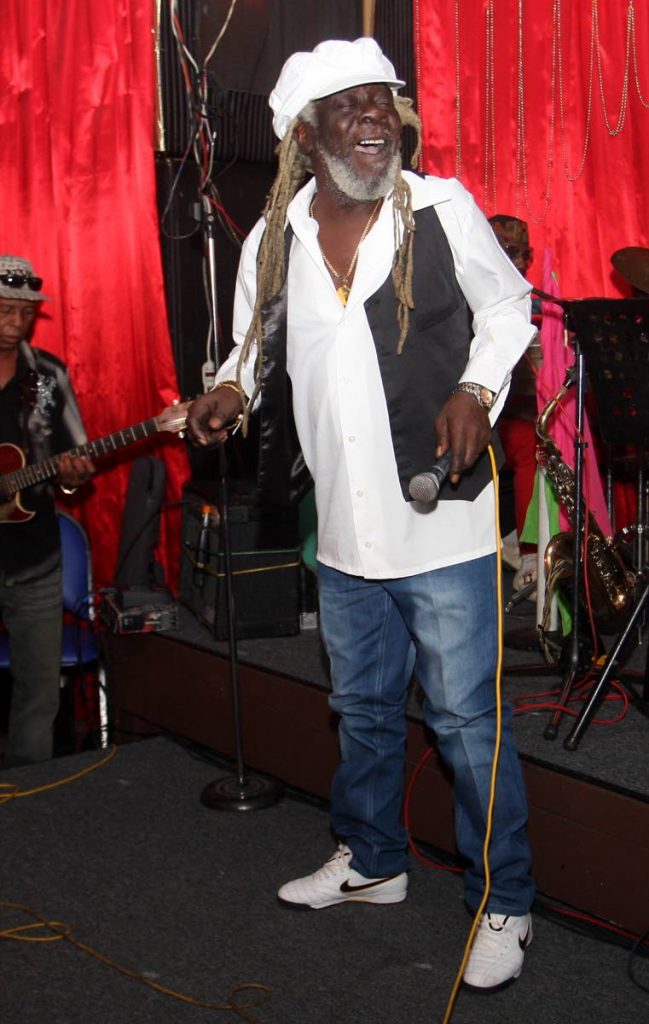Name street after ‘Black Stalin’

A PUSH for calypsonians to be recognised while they are alive and to transform their songs into poetry attached with notes and a CD to be used in schools, were among the recommendations made on the first of five national conversations on the Draft National Policy on Culture and the Arts.
Advocacy for 50 per cent local content, equity in grants, subventions and waivers, a space for indigenous craft, the naming of a street in San Fernando after Black Stalin and education to foster a love for the arts from the embryonic stage of the child, the integration of the Ministry of Foreign Affairs and the National Library into the policy framework, all formed part of the discussion themed, “Creating pathways to Cultural Confidence.”
However, the theme was challenged by almost every academic and practitioner of the diverse art forms who gathered at the Southern Academy for the Performing Arts (SAPA) for the first of the conversations last week.
Rubadiri Victor representing the Coalition of Artists said the policy fails to describe the cultural, contemporary and historical landscape. “How can you prescribe for a context that is not described accurately?” he asked conversation facilitator Marlon De Bique.
He said wrapped up in the policy is three decades of work adopted from drafts over the years and found it a “bit crazy” practitioners were being asked to sign off on a framework in just two hours.
Musician Eugene Bass said if this policy is to instil cultural confidence then legislation to mandate radio stations to play 50 percent local content must be incorporated.
Dramatist and retired curriculum supervisor with the Ministry of Education Victor Edwards countered saying instead of legislating 50 percent local content, there should be an advocacy for limiting the foreign fare on local radio stations to 50 percent.
“Same concept, different perspective, but it is only then when we hold the trump card them we begin to get the kind of confidence in ourselves and our culture, where we tell our own stories, write our own songs and have an appreciation of who we are.”
He said for years there has been the discussion about getting permission to take the calypso and turn them into poetry to be used in schools in order to achieve that cultural confidence in the society. That has not happened.
Responding to Pan Trinbago’s president Keith Diaz suggestions for a ‘straight forward policy on funding’, a clear policy that the ordinary pan man could understand, and a large museum to display the cultural heritage that shapes us, Edwards asked, “where can I go as a practitioner who wants to play Pan in A Minor done so many years ago? Where can I find the notation to that music played by that particular band?”
In advocating for calypsonians to be recognised while they are alive, he again made the plug for a street in San Fernando to be named in honour of calypsonian Black Stalin (Dr Leroy Calliste).
“I have been discussing this with the Mayor of San Fernando Junia Regrello. Stalin’s parents lived right behind the library, he is a five-time Calypso Monarch and yet still we cannot recognise our own.”
Felix Edinborough, who has been keeping the traditional mas alive, especially the pierrot grenade, for over three decades, reminded Bass of Lord Superior’s push for total local content, which he (Supie) had to abandon because of poor advertising support.
Edinborough supported suggestions by Arts By Creative Design that arts education must be considered as one of the pathways to cultural confidence. Its advocate Ivana Kelly-Simmons laboured the point that while children are encouraged to sing, dance and engage in other artistic expressions, this is discouraged once they reach standard four and five in preparation for examinations to transition into a secondary school.
She said it is only when some of these same children do not receive the desired results at the end of secondary school, advances are made to enrol them in an artistic programme.
Edinborough who takes his craft to schools, said for many children his introduction of traditional mas is usually their first experience with this tradition. “It is part of their culture, but I am surprised that they have never seen it. Much more needs to be done to educate our children. Regardless of how good your product is, if nobody appreciates it, it would be a waste of time. We need to give children a taste of the culture to have that sense of confident or regardless of how good you make the callaloo, children would live and die eating Kentucky Fry.”
Policy co-ordinator from the Ministry of Community Development, Culture and the Arts Dr Donna-Mae Knights explained the policy framework is for nurturing, supporting and maximising the tremendous value inherent in TT’s heritage, visual and performing arts and cultural industries in a manner that ensures the growth and development of cultural practitioners, creative entrepreneurs and the cultural ecosystem.

Comments
"Name street after ‘Black Stalin’"